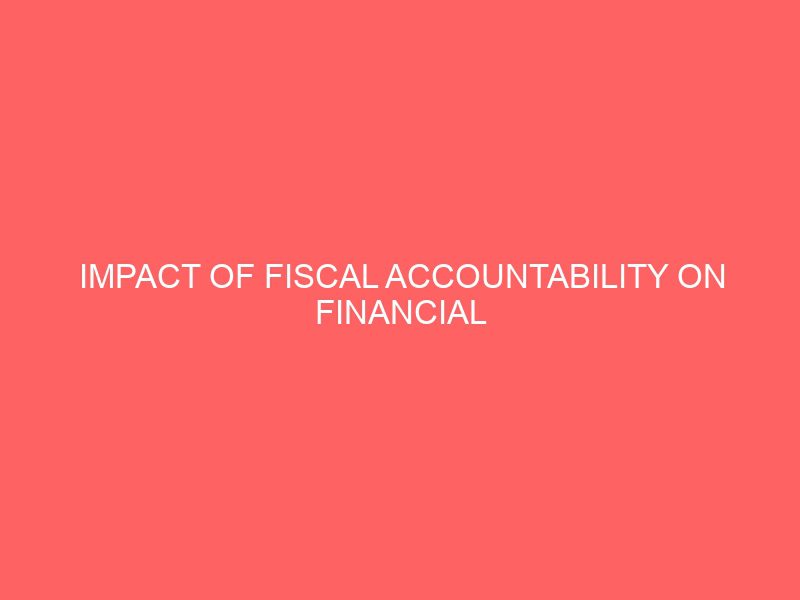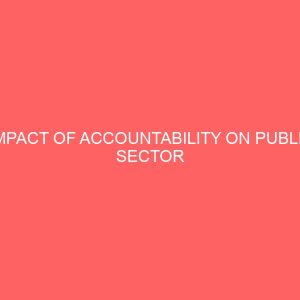Description
ABSTRACT
This research is on IMPACT OF FISCAL ACCOUNTABILITY ON FINANCIAL MANAGEMENT OF PUBLIC SECTOR IN NIGERIA. Fiscal accountability is central to public financial management. Public financial management cannot be realized without effective fiscal accountability. The study examined the impact of fiscal accountability on financial management of public sector in Nigeria. In specific terms, the study investigated the extent to which regulatory laws, compliance reporting and legislative control influence financial management of the Nigerian public sector. The study sampled seven public agencies in Nigeria namely NDLEA, NERC, NOA, NDIC, BPE, DMO and NPC. Questionnaire was used to collect data from respondents, who are accountants and auditors in selected agencies. The descriptive statistics and multiple regression analysis were employed for the analysis of data. Findings revealed that regulatory laws, compliance reporting and legislative control strongly drive financial management of selected agencies. The study suggested amongst others that Government should put in place strategic structure that enables building of fiscal accountability framework and make enabling regulation that protect whistle blowers and creating enabling environment generally for fiscal accountability. These truly have the capacity to enhance financial management in public sector in Nigeria.
CHAPTER ONE
INTRODUCTION
1.1 Background of the Study
Fiscal accountability is a concept deeply rooted in polity and democracy. It is the link that connects the people with the public officers to whom public funds and assets have been entrusted upon. Fiscal accountability is the stewardship reports of public officers stating how public funds are expended on behalf of the people. Fiscal accountability is sine qua non for the functionality of a modern economy and enhancing the material wellness of the populace. In many countries, monies and other resources are handed to public authorities. Assurance of good management is expected to be unveiled to the general public. Fiscal accountability ensures that there is availability of information to assess the performance of public authorities to curtail misuse of power and abuse of resources (Anichebe, 2012). Fiscal accountability in this way ensures that the financial activities of public authorities are open to all and they can equally be held responsible for action and misaction.
Fiscal accountability to Haruna, etal, (2015) refers to requirement that public officers answer to stakeholders and general public, specifically on the utilization of public funds. Adiogu (2013) notes that fiscal accountability pertains to the responsibility of holders of public positions for their actions towards the financial resources of the nation. Fiscal accountability is characterized by the following attributes namely a disclosure system, access to financial information, openness to public participation, absence of unnecessary concealment, preparedness to face public scrutiny and modesty of public officers to answer questions raised by general public. Fiscal accountability is threatened in a system where access to public information is barred.
Financial management focuses on decision making about the use and management of the finances of an organization or corporation. Financial management is a subset of managerial activities that concentrates on how to plan and control the financial resources of an organization. Financial management also involves the sourcing and optimal utilization of funds for the smooth running of an organization. Financial management centers on the identification of possible ways of maximizing the net-worth of an organization, allocation of scarce productive resources between competing demands and execution of strategies to attain the stated objectives of such organizations. Financial management in context of public sector can be describe as process of sourcing, controlling, planning, coordinating, organizing and directing the financial resources of government’s parastatals. These parastatals can be federal ministries, state ministries, local councils, government agencies and departments.
The issue of fiscal accountability in Nigeria has been an issue that has aroused the interest of stakeholders over years. Available statistics from Transparency International reveals that Nigeria is ranked as one of the most corrupt countries in the world. Corruption has become so endemic that it has penetrated every sectors of the Nigerian economy, which has seriously affected fiscal accountability. Despite all the strategies and system of financial management, public officials still siphon funds meant for the public into their personal bank accounts. Lack of fiscal accountability translates to embezzlement, financial misconduct, money laundering, misappropriation and mismanagement of public resources, which are menace to the country. Nigeria has been recognized as a financial terrorist in the global scene because of evidenced crimes such as over-invoicing, illegal capital transfer, illegal currency manipulation, corporate scandals, cybercrimes and diversion of public funds for personal use (Ekpo, 2016).
It is incontestable that lack of fiscal accountability will degenerate into corruption and looting of public treasury. Akinbuli (2015) maintains that the financial records of some public agencies are balanced in arrears while in other agencies, financial records are not appropriately documented. Appah (2012) decry that accountability, sanity and transparency has been abandoned in the Nigerian civil service. This menace can be curbed by the effective use of public accounts, effective use of legislation, and effective implementation of government policies and appropriate auditing of public accounts (Anichebe, 2012). For Nigerian to be seen as a corrupt-free nation, public officers must be ready to issue stewardship reports to general public any time the need arises and also public accountants must ensure that financial records are accurate and authentic.
1.2 Statement of Problem
The public sector is saddled with the responsibility of harnessing public resources, collection of monies (revenue) and their expenditure for the betterment of the populace. There is a strong need for public officers that are accountable to the general public to deliver complete, relevant and accurate information about the management of public funds. The public sector which is regarded as the manager of public resources, statutes and mechanisms for national development has lost its goodwill in the eye of the citizenry due to lack of proper accountability. Haruna, etal, (2015) alluded that government ministries, agencies and departments are not duly adhering to the tenets of accountability. This assertion conforms to that of Akinbuli (2015) who stated that the duties and trust vested on public officers are not effectively and efficiently performed. There has been disrespect for accountability in public sector. Majority of public parastatals in Nigeria do not keep good records of account and they rarely publish annual reports and audited financial statements as at when due. Financial mismanagement, inefficiency, ineffectiveness, maladministration and negligence have been identified by scholars as the characteristics of public sector in Nigeria.
The financial reports of public sector most often are falsified and doctored. In most government parastatals, funds allocated through the budget are not properly utilized. Budgets are prepared and presented late. Also, when there are errors in the budgets, no concrete actions are taken to resolve them.
Another problem is the quota system. The quota system has injected mediocrity into the civil service. Employment in the public service has been on the basis of man-know-man syndrome rather than on merit. Unqualified hands are recruited to handle sensitive positions in the civil service. This gives room for embezzlement and financial misconduct.
Furthermore the problems associated with financial management in public sector amongst others are employment racketeering, corruption in procurement, siphoning of funds meant for infrastructural development into personal bank accounts, stealing of public assets, illegitimate internal revenue collection, award of contracts to wrong contractors, friends and families, payment of salaries and allowances to ghost workers, lack of documentation of overhead expenditures, misappropriate of funds by council executives for illegitimate personal gains, destruction of documents that are not favorable to top management to avoid prosecution after service, nepotism, etc. Most government parastatals are not fully complying with the principles of fiscal accountability. All these problems make accountability very difficult to achieve in the Nigerian public sector.
1.3 Objectives of the Study
The main objective is to examine the impact of fiscal accountability on financial management in public sector in Nigeria.
The specific objectives of the study are:
- To examine the impact of regulatory law on financial management in public sector in Nigeria.
- To assess the impact of legislative control on financial management in public sector in Nigeria.
- To investigate the impact of compliance reporting on financial management in public sector in Nigeria.
1.4 Research questions
The questions of interest in the study are:
- To what extent has regulatory law influenced financial management in public sector in Nigeria?
- To what extent has legislative control influenced financial management in public sector in Nigeria?
- To what extent has compliance reporting influenced financial management in public sector in Nigeria?
1.5 Research Hypotheses
The research hypotheses guiding the study are stated as follows:
- H01: Regulatory law has no significant impact on financial management in public sector in Nigeria.
- H02: Legislative control has no significant impact on financial management in public sector in Nigeria.
- H03: Compliance reporting has no significant impact on financial management in public sector in Nigeria.
1.6 Operationalization of Variables
The study examines the impact of fiscal accountability represented by regulatory law, legislative control and compliance reporting on financial management in Nigerian public sector. The dependent variable is financial management and the explanatory variables are regulatory law, legislative control and compliance reporting. The functional form of the model can be expressed as:
Y=f(X)………………………… (1.1)
Y=f(X1, X2, X3)…………….. (1.2)
Where:
Y= Financial management
X= Fiscal accountability, proxied as regulatory law (X1); legislative control (X2) and compliance reporting (X3).
Model One: Impact of Regulatory Law on Financial Management
Y=f(X1)………………………… (1.3)
Y=β0 + β1X1+ µ……………… (1.4)
Model Two: Impact of Legislative Control on Financial Management
Y=f(X2)………………………… (1.5)
Y=β0 + β1X2+ µ……………… (1.6)
Model Three: Impact of Compliance Reporting on Financial Management
Y=f(X3)………………………… (1.7)
Y=β0 + β1X3+ µ……………… (1.8)
1.7 Significance of the Study
This study through its findings will help to identify the possible factors attributable to improper accountability in financial management in the Nigerian public sector. It is equally expected that the study will provide relevant suggestions that will improve the stability, effectiveness, efficiency and service delivery of public sector in Nigeria.
The study will be of substantial benefits to accounting practitioners as it will help them improve on their routine work and as regard the effective management of the finances of their respective parastatals. Financial analysts will find this work invaluable as it serves as a basis for advising their clients on investment decisions.
Furthermore, this research work will propel the management of local government councils, state and federal ministries, agencies and departments to formulate policies that will enhance the process of accountability, transparency and probity in their operations. It will also assist various agencies established by the government in fighting corruption within their parastatals. Students will equally find this study as a guide in their future research undertakings on the subject matter.
1.8 Scope of the Study
The study examines the impact of fiscal accountability on financial management in public sector in Nigeria. The study is restricted to seven (7) federal parastatals in Nigeria namely: National Drug Law Enforcement Agency (NDLEA); National Electricity Regulatory Commission (NERC); Nigerian Deposit Insurance Corporation (NDIC); Debt Management Office (DMO); National Orientation Agency (NOA); Bureau of Public Enterprises (BPE) and National Planning Commission (NPC).
1.9 Definition of Key Terms
Financial Management
This is concerned with making decisions about the provision and use of a firm’s finances. It is a managerial activity that centers on planning and controlling a firm’s financial resources.
Public Sector
This refers to the fraction of the economy that is controlled by the government. It further includes the organizations, ministries, departments, parastatals and agencies established by the government.
Fiscal Accountability
Fiscal accountability deals with compliance with stipulated laws and regulations, consistency with suitable principles of accounting, accuracy and fairness of financial statements and enforcement of legitimacy of expenditure.








Reviews
There are no reviews yet.